
Sorley MacLean was a Scottish Gaelic poet, described by the Scottish Poetry Library as "one of the major Scottish poets of the modern era" because of his "mastery of his chosen medium and his engagement with the European poetic tradition and European politics". Nobel Prize Laureate Seamus Heaney credited MacLean with saving Scottish Gaelic poetry.

Scottish literature is literature written in Scotland or by Scottish writers. It includes works in English, Scottish Gaelic, Scots, Brythonic, French, Latin, Norn or other languages written within the modern boundaries of Scotland.

Christopher Murray Grieve, best known by his pen name Hugh MacDiarmid, was a Scottish poet, journalist, essayist and political figure. He is considered one of the principal forces behind the Scottish Renaissance and has had a lasting impact on Scottish culture and politics. He was a founding member of the National Party of Scotland in 1928 but left in 1933 due to his Marxist–Leninist views. He joined the Communist Party the following year only to be expelled in 1938 for his nationalist sympathies. He would subsequently stand as a parliamentary candidate for both the Scottish National Party (1945) and British Communist Party (1964).

Scotland is internationally known for its traditional music, which remained vibrant throughout the 20th century and into the 21st, when many traditional forms worldwide lost popularity to pop music. In spite of emigration and a well-developed connection to music imported from the rest of Europe and the United States, the music of Scotland has kept many of its traditional aspects; indeed, it has itself influenced many forms of music.
Terence Ian Fytton Armstrong, better known as John Gawsworth, was a British writer, poet and compiler of anthologies, both of poetry and of short stories. He also used the pseudonym Orpheus Scrannel. He became the king of the unrecognized micronation of Redonda in 1947 and became known as King Juan I.
The Scottish Renaissance was a mainly literary movement of the early to mid-20th century that can be seen as the Scottish version of modernism. It is sometimes referred to as the Scottish literary renaissance, although its influence went beyond literature into music, visual arts, and politics. The writers and artists of the Scottish Renaissance displayed a profound interest in both modern philosophy and technology, as well as incorporating folk influences, and a strong concern for the fate of Scotland's declining languages.
Sydney Goodsir Smith was a New Zealand-born Scottish poet, artist, dramatist and novelist. He wrote poetry in literary Scots often referred to as Lallans, and was a major figure of the Scottish Renaissance.

The culture of Scotland refers to the patterns of human activity and symbolism associated with Scotland and the Scottish people. The Scottish flag is blue with a white saltire, and represents the cross of Saint Andrew.

"Wee Willie Winkie" is a Scottish nursery rhyme whose titular figure has become popular as a personification of sleep. The poem was written by William Miller and titled "Willie Winkie", first published in Whistle-binkie: Stories for the Fireside in 1841. It has a Roud Folk Song Index number of 13711.
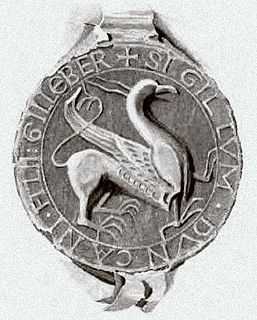
Donnchadh was a Gall-Gaidhil prince and Scottish magnate in what is now south-western Scotland, whose career stretched from the last quarter of the 12th century until his death in 1250. His father, Gille-Brighde of Galloway, and his uncle, Uhtred of Galloway, were the two rival sons of Fergus, Prince or Lord of Galloway. As a result of Gille-Brighde's conflict with Uhtred and the Scottish monarch William the Lion, Donnchadh became a hostage of King Henry II of England. He probably remained in England for almost a decade before returning north on the death of his father. Although denied succession to all the lands of Galloway, he was granted lordship over Carrick in the north.
Professor Duncan Munro Glen was a Scottish poet, literary editor and Emeritus Professor of Visual Communication at Nottingham Trent University. He became known with his first full-length book, Hugh MacDiarmid and the Scottish Renaissance. His many verse collections included from Kythings and other poems (1969), In Appearances (1971), Realities Poems (1980), Selected Poems 1965–1990 (1991), Selected New Poems 1987–1996 (1998) and Collected Poems 1965–2005 (2006). His Autobiography of a Poet appeared with Ramsay Head Press in 1986. He edited Akros magazine for 51 numbers from August 1965 to October 1983. His work to promote Scottish poets and artists included Hugh MacDiarmid and Ian Hamilton Finlay, among others. Some of his poetry was translated into Italian.
Derick Smith Thomson was a Scottish poet, publisher, lexicographer, academic and writer. He was originally from Lewis, but spent much of his life in Glasgow, where he was Professor of Celtic at the University of Glasgow from 1963 to 1991. He is best known for setting up the publishing house Gairm, along with its magazine, which was the longest-running periodical ever to be written entirely in Gaelic, running for over fifty years under his editorship. Gairm has since ceased, and was replaced by Gath and then STEALL. He was an Honorary President of the Scottish Poetry Library, and a Fellow of the Royal Society of Edinburgh and the British Academy. In June 2007, he received an honorary degree from Glasgow University.
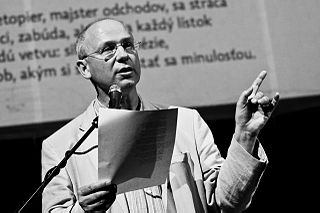
W. N. Herbert, also known as Bill Herbert is a poet from Dundee, Scotland. He writes in both English and Scots. He and Richard Price founded the poetry magazine Gairfish. He currently teaches at Newcastle University.
Alan Scott Riach is a Scottish poet and academic.
John Donald Carrick (1787–1837) was a Scottish journalist and songwriter.
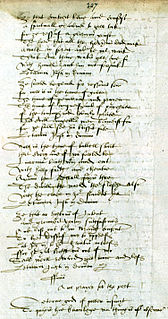
Poetry of Scotland includes all forms of verse written in Brythonic, Latin, Scottish Gaelic, Scots, French, English and Esperanto and any language in which poetry has been written within the boundaries of modern Scotland, or by Scottish people.
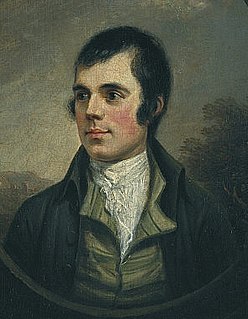
Scots-language literature is literature, including poetry, prose and drama, written in the Scots language in its many forms and derivatives. Middle Scots became the dominant language of Scotland in the late Middle Ages. The first surviving major text in Scots literature is John Barbour's Brus (1375). Some ballads may date back to the thirteenth century, but were not recorded until the eighteenth century. In the early fifteenth century Scots historical works included Andrew of Wyntoun's verse Orygynale Cronykil of Scotland and Blind Harry's The Wallace. Much Middle Scots literature was produced by makars, poets with links to the royal court, which included James I, who wrote the extended poem The Kingis Quair. Writers such as William Dunbar, Robert Henryson, Walter Kennedy and Gavin Douglas have been seen as creating a golden age in Scottish poetry. In the late fifteenth century, Scots prose also began to develop as a genre. The first complete surviving work is John Ireland's The Meroure of Wyssdome (1490). There were also prose translations of French books of chivalry that survive from the 1450s. The landmark work in the reign of James IV was Gavin Douglas's version of Virgil's Aeneid.
Events from the year 1832 in Scotland.
Alexander Laing (1787–1857) was a Scottish verse writer, known as the Brechin poet.
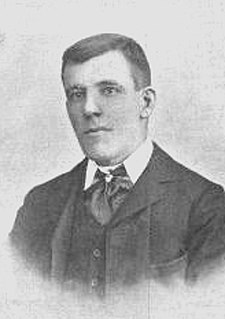
John Malcolm Bulloch (1867–1938) was a Scottish journalist and magazine editor, known also as a genealogist, and a literary and theatre critic.